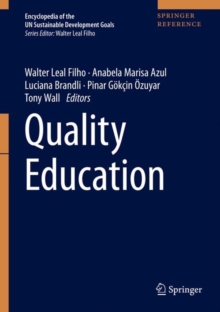The problems related to the process of industrialisation such as biodiversity depletion, climate change and a worsening of health and living conditions, especially but not only in developing countries, intensify. Therefore, there is an increasing need to search for integrated solutions to make development more sustainable. The United Nations has acknowledged the problem and approved the "2030 Agenda for Sustainable Development". On 1st January 2016, the 17 Sustainable Development Goals (SDGs) of the Agenda officially came into force. These goals cover the three dimensions of sustainable development: economic growth, social inclusion and environmental protection.
The Encyclopedia of the UN Sustainable Development Goals comprehensively addresses the SDGs in an integrated way. It encompasses 17 volumes, each devoted to one of the 17 SDGs. This volume addresses SDG 4, namely "Ensure inclusive and equitable quality education and promote lifelong learning opportunities for all" and contains the description of a range of terms, to allow a better understanding and foster knowledge.
Concretely, the defined targets are:
- Ensure that all girls and boys complete free, equitable and quality primary and secondary education leading to relevant and effective learning outcomes
- Ensure that all girls and boys have access to quality early childhood development, care and pre-primary education so that they are ready for primary education
- Ensure equal access for all women and men to affordable and quality technical, vocational and tertiary education, including university
- Substantially increase the number of youth and adults who have relevant skills, including technical and vocational skills, for employment, decent jobs and entrepreneurship
- Eliminate gender disparities in education and ensure equal access to all levels of education and vocational training for the vulnerable, including persons with disabilities, indigenous peoples and children in vulnerable situations
- Ensure that all youth and a substantial proportion of adults, both men and women, achieve literacy and numeracy
- Ensure that all learners acquire the knowledge and skills needed to promote sustainable development, including, among others, through education for sustainable development and sustainable lifestyles, human rights, gender equality, promotion of a culture of peace and non-violence, global citizenship and appreciation of cultural diversity and of culture's contribution to sustainable development
- Build and upgrade education facilities that are child, disability and gender sensitive and provide safe, non-violent, inclusive and effective learning environments for all
- Substantially expand globally the number of scholarships available to developing countries, in particular least developed countries, small island developing states and African countries, for enrollment in higher education, including vocational training and information and communications technology, technical, engineering and scientific programmes, in developed countries and other developing countries
- Substantially increase the supply of qualified teachers, including through international cooperation for teacher training in developing countries, especially least developed countries and small island developing states
Editorial Board
Olivia A.M. Freeman, Johannes M. Luetz, Petra Molthan-Hill, Theam Foo Ng, Umesh Chandra Pandey, Rudi Pretorius, Valeria Ruiz Vargas, Pinar Gökçin Özuyar


